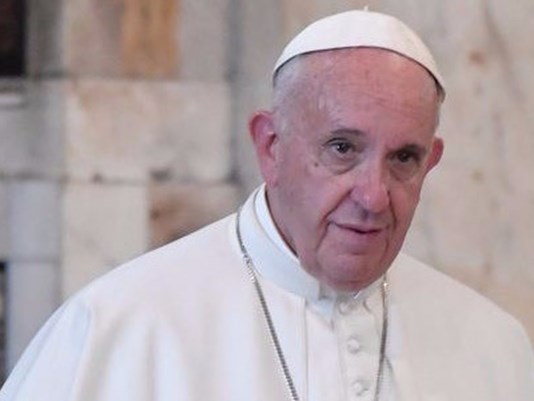Bishops from across the world meet at the Vatican Thursday for a landmark summit on combating child sex abuse within the Catholic church — a potentially historical turning point for an institution plagued by scandal in recent years.
Convened by Pope Francis, the summit, which will run for four days, will bring together heads of around 100 bishops’ conferences from every continent to address abuse cases from around the world.
“This summit is so unprecedented it doesn’t even have a name,” Christine Pedotti, editorial director of French Christian newspaper Témoignage Chrétien, told FRANCE 24.
“It’s an internal communications operation to tell all leaders of the Catholic Church that the Vatican can no longer tolerate these scandals, but also a public relations exercise to show the world the church is tackling the problem head on.”
With the Catholic Church struggling to respond to child sex abuse allegations from Chile to Australia, the summit comes at a critical time for the Vatican.
As a reminder of the scale of the problem, French officials on Monday authorised the release of the film ‘By the Grace of God’, which details allegations of sexual abuse against French Catholic priest Bernard Preynat. On the same day, a second allegation of sexual assault was filed against the Vatican’s ambassador to France, Luigi Ventura.
Concrete action
But victims of sexual abuse are hoping the summit will be much more than a mere PR operation and are looking for the Vatican to take concrete measures to deal with the crisis.
Victims’ associations have called for the immediate dismissal of perpetrators and those who help cover up their crimes, a clear definition of what constitutes the sexual abuse of a minor, and for clerics found guilty of sexual abuse to be placed on a global public registry.
Other demands include the creation of an “independent Vatican Truth Commission”, the publishing of the Church’s archives on sexual abuse from across the globe, including those of the Holy See, and the obligation to turn over the files to local law enforcement so independent investigations can be launched.
Pope Francis at least seems determined to bring about change. In the run-up to the summit, and for the first time in the long history of the Catholic Church, the Vatican expelled one of its top-ranking cardinals from the priesthood, in the form of Theodore McCarrick. The 88-year-old ex-archbishop of Washington was defrocked after a Vatican investigation found him guilty of sexual crimes against adults and minors.
“It was an extraordinary decision,” says Pedotti, “I’ve never come across something like it in my research into the history of the Church.”
Denial
But not everyone in the Church seem to share the Pope’s resolve, according to Gino Hoel, editor at Christian news site Golias-news.fr.
“Pope Francis set out to change things with this summit, but along the way he became away that a lot of bishops have never even met with victims of sexual abuse,” says Hoel. “Some of them, especially in Africa and Latin America, minimise or even deny cases of pedophilia, which to them only exist in the West.
“They can also conflate pedophilia, sexual abuse and homosexuality. And some of the faithful are on the same wavelength and it’s not easy to get the ball rolling in that context.”
Victims’ associations are also asking for the issue of priests’ celibacy to be called into question and it should at least form part of the discussions at the summit — another first, according to Pedotti.
“The subject has never been on the Vatican’s agenda before,” she says. “But I don’t think anything will come of it as it’s not directly linked to the subject of paedophilia. But the Pope intends to make some changes regarding this issue in the coming months.”
As to what concrete changes will come out of the summit, Church observers are less than optimistic, seeing “one or two measures, at most” being the most likely result, says Pedotti, such as bringing judicial proceedings against culprits or speeding up the Vatican’s own internal processes. But even this would be considered a significant change within the Catholic Church, she points out, even if “seen as the bare minimum from the outside”.
Church’s future in cardinals’ hands
Whatever the outcome, the need to act could not be more urgent for those who despair at the damage being done to the Catholic Church’s reputation as scandal after scandal hits the headlines.
“Trust in the Church has been broken,” says Hoel. “I don’t know any parents anymore who would entrust their child to a religious institution or enroll them in catechism programs without having second thoughts. The Church is falling apart before our eyes as a result of decades of inaction.”
Meanwhile, members of the clergy are struggling to deal with the fallout, says Hoel.
“All my friends who are priests are overwhelmed by this series of scandals. The way they’re seen by civil society and the climate of suspicion are hard to bear and for them the situation cannot go on.”
One thing is certain, the Catholic Church is facing a crossroads in its history. For Hoel, the very future of the Church is in the hands of the bishops and cardinals gathering at the Vatican.
“If nothing comes of this summit, many faithful may turn their backs on the Church,” he says.
“I don’t know if what we’re seeing is more or less important than the Protestant Reformation,” adds Pedotti. “But it is something of that order.”
FRANCE24

Leave a Reply
You must be logged in to post a comment.